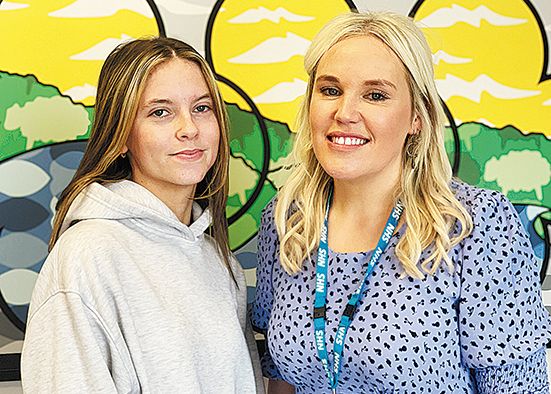Louise in praise for her ADHD support
Louise in praise for her ADHD support
9 October 2024

A DOWNPATRICK teenager, diagnosed with Attention Deficit Hyperactivity Disorder aged just 11, has praised the support she has received from the South Eastern Trust.
Louise Wiggins said the help she has received “makes her feel seen” and next February the 18 year-old starts a nursing degree course at Queen’s University.
October is ADHD Awareness month and is dedicated to raising awareness of, and educating the public about the condition.
At times, those with ADHD can feel misunderstood and frustrated. They have a difference in their brain chemicals called neurotransmitters and it is these that are used up more quickly in the ADHD brain, affecting the ability to pay attention.
Louise said she had a “difficult period of time” during her primary school and early post primary stages but is now about to become an undergraduate.
“It’s almost as if you stand out from everyone else because you have ADHD,” she said, crediting the health trust’s senior autism practitioner Veronica Bailie and the ADHD team based at the Downe Hospital for all their help.
“Veronica is someone to talk to and she understood what I was saying. Veronica is brilliant, she makes you feel seen,” she continued. “Anything that you are feeling, you can describe that to her, it’s not just a matter of coming in for your check-ups.
“I was 11 when I got my ADHD diagnosis and it answered a lot of questions for me and my family. It was hard for everyone to process in terms of ‘how do we get the help that she needs?’ but with help from Veronica, we were able to work to get the medication that suited and worked for me.”
Louise is looking forward to the next chapter of her academic life when she starts studying for her nursing degree.
“It is so important to feel seen and heard and that is what I have felt since meeting with the team and working with Veronica,” she added.
Veronica described how she and the dedicated ADHD team cover the Children’s Centre at the Downe Hospital and others in Newtownards and Lisburn, where they assess, diagnose and carry out medication reviews for children at aged between six and 18.
“Five per cent of school age children will present with symptoms of ADHD and early detection and treatment will help a child achieve their potential,” she said. “The right treatment plan will work for them and compliment that child educationally as well as socially.”
Veronica also outlined how much she and the team value the children and young people they see and work with.
She added: “The children are great. We learn so much from them and it is so important as part of our review process that we ensure that a child’s treatment plan is still meeting the demands of the day. It is so important that there is awareness on ADHD.”
The Downe Hospital’s consultant community paediatrician, Dr Cathy Macpherson, has been working for the health trust for many years.
“During that time, I have had the privilege of looking after children with ADHD. We work in a great team of doctors, specialist nurses and others who work in this area. It is a very worthwhile and satisfying area to work in,” she said.
Dr Macpherson said treating ADHD can make such a huge difference to a child and young person’s life.
“I have many parents who come back and tell us that recognising ADHD and prescribing medication to treat it can be a significant game changer for them. It helps children to settle and pay attention in school and that feeds into their positive self-esteem and their well- being,” she said.
“Children with ADHD have huge qualities, these children are full of life and energy. They have a great sense of humour, but when your mind is very busy and very easily distracted, it makes it very difficult to sit and settle and that can lead to frustration. Being able to treat that is immensely important.”


